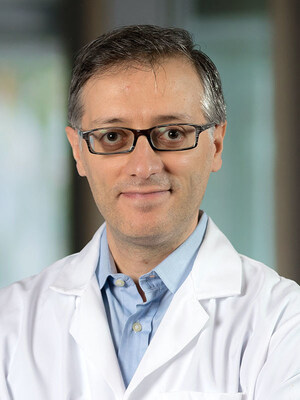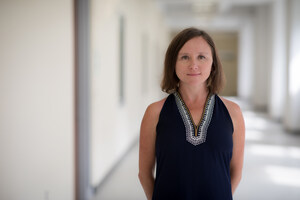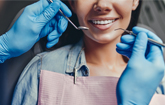BRONX, N.Y., July 11, 2016 /PRNewswire-USNewswire/ -- More than one-third of Bronx residents are born outside of the United States. Often separated from family, challenged by language barriers, unfamiliar with health resources, and burdened by poverty, they are at high risk for health problems. And these risks extend to their young children.
Now, researchers at Albert Einstein College of Medicine and Montefiore have received a $3.7 million grant from the National Institutes of Health (NIH) to test a new intervention to improve the health outcomes of children of South Asian immigrants. South Asians are the fastest growing immigrant community in the United State and recent arrivals often lack access to good medical care.
Community health workers, who will also be South Asian women, will visit nearly 400 mothers with newborns in the Bronx and greater New York area to help them learn healthy feeding practices and improve oral hygiene for their children.
"We've found that many new mothers bottle-feed more frequently and delay weaning to a later age than is optimal for their children," said Alison Karasz, Ph.D., associate professor of family and social medicine at Einstein and principal investigator on the project. "This can result from overcrowded homes, where mothers feel pressure to keep their children quiet, or concerns about children getting enough to eat. Based on our pilot program, we expect that when mothers are provided resources and support from someone they see as their peer, feeding practices will improve—and so will children's health."
The home-based intervention is titled Child Health Action to Lower Oral Health and Obesity Risk, or CHALO!, which means "Let's go!" in Hindi. It will target excess bottle-feeding and the extended use of bottles and "sippy" cups—the two most significant risk factors for childhood obesity and cavities.
"We know that health behaviors and eating patterns in the first few months of life can have an oversized impact on long-term health," said Dr. Karasz. "Obesity and caries, or tooth decay, are the two most common childhood diseases in the United States and impose a significant, lifelong burden."
Community health workers will visit 377 South Asian mothers of children aged 4 to 5 months and their families six times over the course of a year and will supplement with phone support. They will work with the mothers and their families to make concrete changes, such as:
- Listening and responding to children's cues about when they are hungry and when they are full
- Making and keeping dental visits
- Ending the common practice of using food to pacify children
To evaluate the efficacy of the intervention, the health workers will assess the children's oral health and height and weight at 6, 12 and 18 months of age. They will use novel devices and techniques, including an inter-oral camera to capture images of the teeth. These images will be sent to the University of Rochester dental school for review. They'll also use an iPad program to assess children's feeding and oral health practices, in collaboration with Columbia University dental researchers.
Einstein researchers are partnering with a New York-based nonprofit organization, Sapna NYC, to deliver this home-based intervention. The mothers will be identified through Montefiore and the South Asian Practice Partnership for Health Improvement and Research, a practice-based research network for South Asian primary care practices. Dr. Karasz is executive director and co-founder of Sapna NYC, which started from a research project on women's depression funded by the NIH. Karen Bonuck, Ph.D., professor of family and social medicine at Einstein, is the project's co-principal investigator. Dr. Bonuck conducts research on early childhood feeding.
The title of the grant is "Obesity and Caries in Young South Asian Children: A Common Risk Factor Approach" (1R01MD010460).
About Albert Einstein College of Medicine
Albert Einstein College of Medicine is one of the nation's premier centers for research, medical education and clinical investigation. During the 2015-2016 academic year, Einstein is home to 731 M.D. students, 193 Ph.D. students, 106 students in the combined M.D./Ph.D. program, and 278 postdoctoral research fellows. The College of Medicine has more than 1,900 full-time faculty members located on the main campus and at its clinical affiliates. In 2015, Einstein received $148 million in awards from the National Institutes of Health (NIH). This includes the funding of major research centers at Einstein in aging, intellectual development disorders, diabetes, cancer, clinical and translational research, liver disease, and AIDS. Other areas where the College of Medicine is concentrating its efforts include developmental brain research, neuroscience, cardiac disease, and initiatives to reduce and eliminate ethnic and racial health disparities. Its partnership with Montefiore Medical Center, the University Hospital and academic medical center for Einstein, advances clinical and translational research to accelerate the pace at which new discoveries become the treatments and therapies that benefit patients. Through its extensive affiliation network involving Montefiore, Jacobi Medical Center—Einstein's founding hospital, and three other hospital systems in the Bronx, Brooklyn and on Long Island, Einstein runs one of the largest residency and fellowship training programs in the medical and dental professions in the United States. For more information, please visit www.einstein.yu.edu, read our blog, follow us on Twitter, like us on Facebook, and view us on YouTube.
Logo - http://photos.prnewswire.com/prnh/20120531/DC16559LOGO
SOURCE Albert Einstein College of Medicine
Related Links
WANT YOUR COMPANY'S NEWS FEATURED ON PRNEWSWIRE.COM?
Newsrooms &
Influencers
Digital Media
Outlets
Journalists
Opted In






Share this article